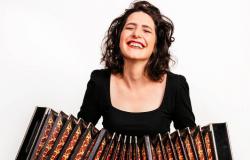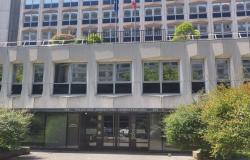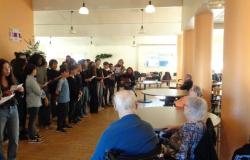OULED EL BLED : CHILDREN OF THE COUNTRY
OULED EL BLED brings together musicians of French origin who have chosen to live in Morocco, fully immersing themselves in its culture. After studying the oud in Lyon, Frédéric Youssef Calmès and Léo Fabre-Cartier settled in the Fez region, where they adopted Moroccan traditions and customs on a daily basis and integrated popular Music at the heart of their artistic approach.
- Frédéric Youssef has been a member of the Hamadcha Sufi brotherhood of Fez for more than 20 years with master Abderrahim Amrani Marrakchi.
- Léo, who arrived in 2012, perfected his art of the oud then the lotar with the masters Ahmed Chiki, specialist in Arab-Andalusian music, and Younes Baammi, disciple of the late Mohamed Rouicha.
- Étienne Gruel joined them in 2015 as a specialist in daf, riqq and derbouka. In Fez, he became a student of Said Idrissi Oudghiri, conductor of Najat Aatabou and famous Moroccan percussionist.
The work of OULED EL BLED is distinguished by the mastery of the Darija language and by innovative arrangements that reinterpret the sonic and musical riches of the country while preserving their depth and authenticity.
The name « OULED EL BLED »which means “the children of the country”, embodies their deep attachment to Morocco, a country that they now consider as their own. The title of their first album, Gwer Mgharba, can be translated as “The Moroccan whites” and is not pejorative. It represents their pride in claiming to be mixed artists, anchored in Moroccan traditions while carrying their own multicultural journey.
GWER MGHARBA: A FIRST ALBUM ROOTED IN MOROCCAN CULTURE
L’album Gwer Mgharba bears witness to the years of life of artists in Morocco, alongside Sufi brotherhoods, musicians from the Middle Atlas and artisan singers from the medinas. The pieces, sung in Darija with striking authenticity, reflect the group’s captivating human and musical experiences, nourished by everyday life (Taxi El Kebira or Moul Hanout), mischievous texts by Houcine Slaoui and popular poetry by Abdessadeq Cheqara (Houriyat Al Bahar), pillars of the Moroccan soul such as Sufism (The Ouerchan, Hamadcha) or the legendary hospitality of the Moroccans (Hello) and of course love (Winek).
OULED EL BLED weaves a harmonious dialogue between traditional musical influences and the emblematic instruments of Morocco. The lotar, oud, derbouka and taarija blend subtly with the guitar, riqq, daf and qanoun. These arrangements authentically deliver a vibrant work, dedicated to a country that inspired and transformed the members of the group.
OULED EL BLED: CO-CREATION AT THE HEART OF THEIR MUSIC
In this adventure, OULED EL BLED was accompanied by three exceptional musicians: Faith Bale Barker, Kahina Afzim and Dalal El Bied. They each collaborated with the group at different stages of the creation of this first album.
Faith Bale Barker is British-New Zealander and speaks fluent Darija. She participated in the writing and arrangement of the songs. Then, Kahina Afzim, exceptional singer and qanoun player, lent her voice and her musical talent to the recording of the album. Finally, Dalal El Biedsinger and violinist, is one of the most promising talents on the Moroccan music scene. Trained in singing and Gharnati violin with Nacerddine Chaabane and Rachid Toumi, she officially joined the group in November 2024 and strengthens the multicultural identity of OULED EL BLED and their ability to fuse multiple traditions while remaining faithful to the Moroccan soul .
“Dalal El Bied’s contribution is invaluable. His mastery of the violin and his vocal approach will bring tremendous breath to our repertoire, while respecting the authenticity of the traditional music that we love so much. ” explain Frédéric Youssef Calmèsguitarist and singer of the group.
TRIBUTE TO MOROCCO, OUR LAND OF WELCOME AND TRANSFORMATION
Frédéric Youssef Calmès, known for his cultural show “Authenticia” on Luxe Radio, is the guitarist and singer of the group. He confides : “This album is a tribute to our life in Morocco, to our masters and our brothers as well as to each encounter marked by the warmth and generosity of the Moroccans. It bears witness to the profound impact that the country’s culture and traditions have had on my journey, celebrating the connections made over time and the precious memories that have shaped me.”
For his part, Léo Fabre-Cartier, passionate oudist and lotarist, also known to be a member of the group Araw n Fazaz by Younes Baami, disciple of Rouicha, adds : “Gwer Mgharba represents a testimony to the significant influences that I have accumulated during my twelve years in Morocco. This project illustrates my commitment to highlighting the musical and cultural traditions that animate the Kingdom. Each interaction and each experience has enriched my professional life, allowing me to integrate this incredible musical richness into our artistic approach. »
The percussionist Étienne Gruel, disciple of Said Idrissi Oudghiri, concludes with emotion:
“This album embodies much more than a simple musical creation, it is a bridge between my personal experiences and the cultural riches of Morocco to which I am deeply attached. “It’s a precious opportunity to share this vibrant connection and deep joy with audiences, while paying homage to the land and traditions that have so warmly welcomed me.”
A FIRST TOUR TO MEET THE PUBLIC
OULED EL BLED lit up three Moroccan stages between November 20 and 23, 2024, performing first in Fez, then in Rabat as part of the Visa For Music festival, before closing in style in Khouribga. With a remarkable mastery of traditional Moroccan instruments and a repertoire from modern and ancient musical heritages, sometimes almost forgotten, they captivated more than a thousand spectators, including Moroccan and international professionals. They were unanimous in welcoming their ability to revive an ancestral musical memory, while infusing it with contemporary and innovative energy.
“OULED EL BLED plays music from our heritage and revives a memory that deeply touches every Moroccan, whether man, woman or young,” underlines a director of the Moroccan festival.
A Moroccan artist manager on the international scene adds: “Revisiting Hamdouchia music with new arrangements is unprecedented. In Morocco, Gnaoua music and Aïta have been reinterpreted by talented artists, and it was time for the Hamadcha to be highlighted. I believe that Frédéric’s exceptional mastery, acquired over many years alongside the Hamadcha of Fez, breathes new life into this music so dear to our hearts. »
A spectator of the Khouribga concert confides enthusiastically: “At home, we say Ouled El Bled, Khobez O L’berrad (the bread and the teapot – symbol of humility). This group deserves to be even better known, because it illustrates with subtlety and humor the most beautiful values of our Moroccan culture. »






